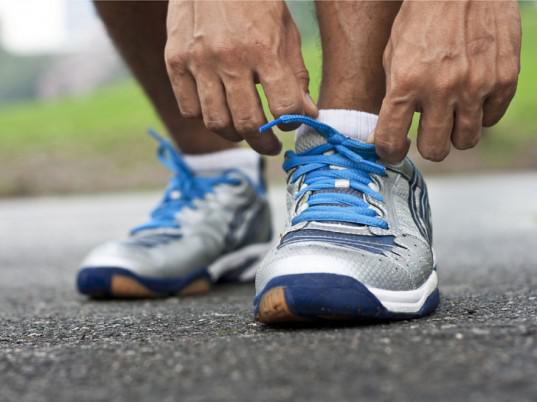When you decide to start Couch to 5K such as our Night Run on the 12th of October this year, you need to firstly make a training plan and examine all the potential barriers that could get in the way and work out in advance how you’re going to deal with them. Making a commitment to becoming more active is great and is so important for your health, but making a change like this will require effort and dedication.
“Being physically active is one of the most important steps that people of all ages can take to improve their health and well-being” Janette, Physical Activity Specialist, Croí
In terms of clothing, you don’t really need technical gear. You just need something loose and comfortable in a breathable material, like cotton. Try not to wear new clothing on the day of the event. Always wear clothing you have trained in previously. It is strongly advised to purchase good supportive running shoes. Any distance above the 5km distance should be shock-absorbent especially if running on the road. It can take 25-30 miles to ‘break in’ a new pair of runners so purchase them well in advance of the 5km event and clock up the miles by walking around in them as much as you can. This will help prevent injury and blisters. Do not buy new runners within 4 weeks of the race. Running socks will also help prevent blisters and are advised in wet weather conditions and when new runners are purchased.
Each training session should include a warm-up and cool-down. This can involve a 10-minute walk or slow jog with some mobility exercises to get the joints moving especially the hip, knee and ankle joints. Don’t just go out the front door and start running. As for stretching before a run, opinion is divided on whether this is necessary or even helpful however muscle activation and range of motion exercises are extremely beneficial. For a warm-down, the worst thing you can do is stop running and immediately sit down, so keep walking until you’re fully recovered. You may want to put on an extra layer of clothing while cooling down, as this will stop you getting cold. Stretching can be done during the cool-down but make sure your muscles are still warm. Never stretch cold muscles. If you have known cardiovascular disease then the warm-up should be at least 15 minutes and the cool-down must be at least 10 minutes.
Warm-up tips
- 15 minutes in length
- Should be progressive
- At a light intensity
- Include range of motion exercises particularly hips, knees and ankles
- If you want to include stretching (only stretch muscles when warm aka end of warm up). Include all major muscles.
Don’t worry about how fast you are running. Speed will come later once your aerobic baseline fitness has improved. Just increase the duration of your runs gradually. It is important that your first runs should be completed at an effort and pace that is easy and comfortable. Most beginners don’t know what an easy or comfortable pace should be so they tend to push too hard. A comfortable pace is one you feel confident you can sustain for the duration of your run. A simple way to determine your pace and effort is to listen to your breathing. If you aren’t gasping for air and you can talk while you’re running, then your pace is just right. Don’t be afraid to walk.
Once the fitness levels improve you can start to work on speed. Once a week is adequate enough e.g.
Week 1: 30 seconds @ 75% effort 2-3 minutes recovery (walk/40% pace) repeat 6-8 times
Week 2: 30 seconds @ 80 % effort 2-3 minutes recovery (walk/40% pace) repeat 6-8 times
Week 3: 800m with 3 – 4 minute recovery periods. Repeat 4-5 times.
Week 4: 1000m with 3 – 4 minute recovery periods. Repeat 4 times.
If this is your first 5km race then I would strongly advise not to worry about time or how fast you run it. Your overall goal is to cover the distance and get to the finish line. Overall the most important objective on the day and of the whole training process is to go out there and have fun.
It’s important to have energy for your run, but don’t overdo it. Avoid having a large meal within two hours of your run. There is completion for blood flow during exercise as our muscles require more energy and oxygen. If we consume a large meal too soon before exercise there will be an increased demand for blood flow from the digestive system and as a consequence there will be less oxygen and nutrients available to our working muscles. However, a light snack, such as a banana, before running is fine. As for water, provided you are drinking enough throughout the day, this should not be problem. Some people like to have a water bottle with them while running and it’s important to re-hydrate afterwards.
Janette, Physical Activity Specialist, Croí
